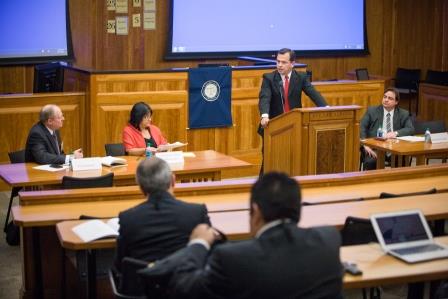Symposium 2014: Latin America – Governmental Perspectives

Reported by Jordan Pendergrass
The theme of the 21st Annual International Law and Religion Symposium was “Varieties of Secularism, Religion, and the Law”. On 7 October 2014, one session was devoted to the perspectives of Latin American governments. The session was moderated by Scott Isaacson, Regional Coordinator for Latin America of the International Center for Law and Religion Studies.
The first presentation during the session was given by Frezia Sissi Villavicencio Rios, General Director of Justice and Religion, Ministry of Justice of Peru. Ms. Villavicencio demonstrated that the current intersection of law and religion in Peru is linked to its past. She noted the country’s diverse religious landscape and the fact that, notwithstanding the significant impact of colonization, many indigenous religions remain. Indigenous peoples, including the Andean and Amazonian peoples, add to the country’s diversity and are an important consideration of governmental affairs. Ms. Villavicencio explained that there is movement of people within Peru, leading to a shift in the political-religious dynamic. It was also explained that significant religious and linguistic diversity has necessitated a particular social structuring that allows for proper minority expression and a variety of legal systems. She concluded her remarks by conceding that, as in any society, there is conflict; however, peace in Peru is an attainable goal and faith traditions can and should contribute to the realization of that ideal.
Gabriel Iván Álvarez, Director of Relations with Religions and NGOs, Ministry of Government of San Juan, Argentina, was the session’s second speaker. With regard to the intersection of law and religion, Mr. Álvarez explained that the governmental approach focuses on four areas: registration, administration, training, and spaces for citizen participation. The local spaces for citizen participation are visible through the Oratorio Interreligioso Provincial, the Red de Organizaciones Sociales de Acción Solidaria, and the Mesa Interreligiosa Provincial de San Juan. He noted the positive contributions that religious organizations can make, and he expressed gratitude for service performed in San Juan by members of The Church of Jesus Christ of Latter-day Saints. It was further explained that, rather than governmental and religious organizations being in competition, these separate entities occupy a shared space and, despite different mechanisms, often have similar societal goals. Mr. Álvarez concluded his presentation by restating the Final Declaration of the 2014 International Congress of CALIR (Consejo Argentino para la Libertad Religiosa). The Congress met just one month earlier, and its message can be accessed by clicking here.
Herminio Lobos Centurión, Paraguayan Minister of Education and Culture, was the session’s concluding speaker. He noted the benefit of and need for social education with respect to law and religion. He emphasized the role of knowing the historical foundations of religious liberty. Mr. Lobos characterized Paraguay as a secular state; however, he emphasized the country’s constitutional protections. Religious independence and respect go hand in hand, and the government has made an effort to create social spaces in which religious freedom can flourish. Mr. Lobos was pleased with the favorable report on Paraguay in the International Religious Freedom Report by the U.S. Department of State. He applauds the positive contributions made to society by religious organizations.